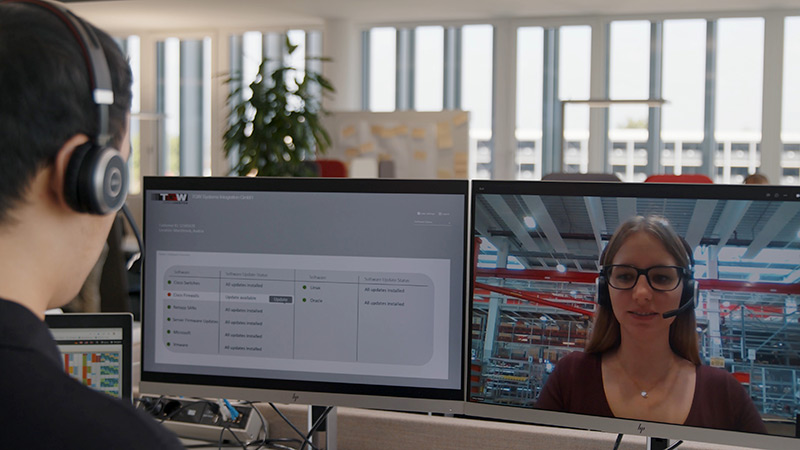TGW Logistics Group is setting the example for why remote services are worthwhile for highly automated systems.

(Marchtrenk, Austria) Remote Services enables warehouse automation specialists to access highly automated distribution centers and carry out troubleshooting in real time. The trend is not to simply respond to problems, but to analyze data and simulate scenarios proactively to enable maximum availability for customers. TGW Logistics Group is setting the example for why these services are worthwhile.
Customer expectations for service and delivery continue to rise. If your car goes in for repairs, you get it back the next day, fixed with a new spare part. If you order a shirt online in the morning, you can already try it on next day. Quick commerce delivery can bring snacks for your late night TV watching within three hours. The companies that want to meet these kinds of delivery promises need high-performance automation that runs without a hitch, 24-7.
An unplanned standstill in a distribution center causes delivery delays and upsets customers. The mere thought of a successful hacker attack—and thus a days-long standstill—makes those responsible for operations break into a sweat. The chaos does not need to reach a maximum level, either. Even small software problems elevate the blood pressure of those in management. Years ago, warehouse automation system providers introduced what are known as Remote Services to offer customers maximum availability. Example: TGW Logistics Group. The Austrian company is now offering nine different services remotely within its Lifetime Services (LTS) unit, and is continually developing new ones. “Remote Services are increasingly in demand because clients want greater availability,” says Georg Katzlinger-Söllradl, Director Global Lifetime Services at TGW.
Two major driving factors account for why customers are making increasing use of remote services. First, money is saved with fewer in-house employees needed on-site. Secondly, companies want to protect themselves from internet crime, particularly hacker attacks. They want external experts to update the systems to the latest security standard on a regular basis.
Hacker attacks on the supply chain have increased since the COVID-19 pandemic began. Some 81 percent of those surveyed in a 2021 IT study with 1,451 decision makers reported that they were seeing more cyber threats during the pandemic. Fifty-six percent surveyed experienced critical instances of a standstill, resulting in damages of more than $100,000 US dollars.
According to the study, however, companies place a low priority on cybersecurity, despite the fact that their IT departments have recognized the elevated threat level. Katzlinger-Söllradl observes that companies who have already learned the hard way or heard about such incidents firsthand are the most likely to take the topic seriously. He sees big corporations as being in a better place in this regard than medium-sized ones. “However, there are also major corporations that believe you have to do everything yourself in order to save money,” says Katzlinger-Söllradl.
The fact is that where IT is concerned, you need in-depth specialized expertise. TGW can draw on the experience of more than 1,000 completed systems and offers ongoing training to its experts. A total of more than 130 specialists work in their Remote Services. Customers with complete systems built by TGW that include a Warehouse Management System (WMS) also benefit from the fact that TGW’s software developers are easy to contact and no third-party suppliers have to be involved.
Another point that differentiates TGW’s Remote Services from other providers is that customers reach the in-house Support Center directly via the hotline. TGW even does its own first-level support rather than outsourcing it to a provider. This enables TGW to solve about 90 percent of all problems in the software area. Only in extremely complex cases, such as combined software and hardware problems, is it necessary for technicians to be on site.
System operators can combine various service modules with each other:
About TGW Logistics Group:
TGW Logistics Group is a leading systems integrator of automated warehouse solutions. With over 50 years of experience the automation specialist designs, manufactures, implements, and maintains end-to-end fulfillment solutions for brands such as Urban Outfitters, the Gap, and TVH.
TGW Logistics Group has subsidiaries in the US, Europe, and China and employs more than 4,400 people worldwide. In the 2021/22 fiscal year, the foundation-owned company generated a revenue of $924 million US dollars.
Contact:
TGW Systems Inc.
3001 Orchard Vista Dr SE STE 300, Grand Rapids, MI 49546
T: 616-970-7163
tgw@tgw-group.com
Press contact:
TGW North America:
Lisa Weilharter
Director of Marketing & Business Development
T: 616-970-7163
lisa.weilharter@tgw-group.com
Scott Ellyson, CEO of East West Manufacturing, brings decades of global manufacturing and supply chain leadership to the conversation. In this episode, he shares practical insights on scaling operations, navigating complexity, and building resilient manufacturing networks in an increasingly connected world.